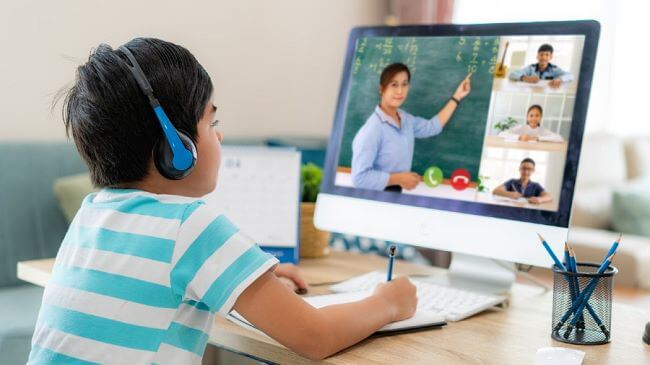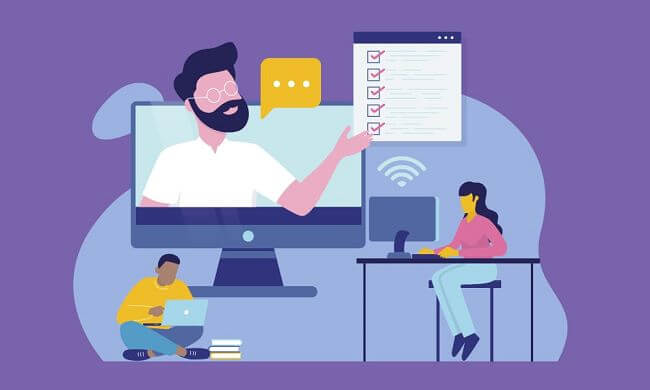Advantages and Disadvantages of Online EducationIn the time of the COVID-19 pandemic, online learning or online classes for students have established themselves as the new standard. To prevent the virus from spreading, colleges and institutions had to implement rigorous lockdown procedures and close classrooms. The entire closure of educational institutions resulted in a significant disruption to academics and a significant gap in students' learning. However, the majority of institutions were able to set up online courses for pupils that provided secure studying at home. The major debate is, however, whether online education is indeed advantageous for pupils or whether it has any negative consequences for them. In this section, we'll examine some of the main benefits and drawbacks of online education for students. 
Advantages of Online Education1. Maintains students' regular attendance and discipline Students in a virtual classroom must arrive on time and with an open mind. It has helped them establish a pattern again to set a specific goal each day and don't waste time on irrelevant things. They are given assignments and homework to keep the pupils focused on their academics and in good study habits. In this way, despite the closure of the schools, the kids are still able to learn through online classes. 2. Accessible from anywhere The facility for students to attend classes in any location they choose is another significant benefit of online education. All they require to take part in the program is a computer, laptop, or smartphone with an active internet connection. The daily problems associated with traveling to school are no longer an issue for students. Now all students need to do to start class is turn on their devices & sign in when it's time. The student's attendance has also increased as a result of this. 3. The price of online education is less This can be considered a huge benefit at this time, as the pandemic already has an impact on many families' finances. The cost of taking online classes has decreased significantly for both students and educational institutions. The expense of maintaining their infrastructure has lessened as a result of the schools being shuttered. This has led to a decrease in students' school fees, making education more affordable for them. The expense of commuting has also been avoided with online education. 4. Less distraction The presence of big class groupings might be distracting for many students who prefer to learn alone. It could be challenging for you to focus on the stuff the teacher is teaching due to some of the class's more notorious students. In contrast, there's no such issue in online courses. Every single student has a one-on-one relationship with the teacher, which aids in speedy learning. 5. Prevents the spread of illnesses among students The absence of physical contact and social interaction is a benefit of taking virtual classes. As a result, their immune systems remain healthy because they are protected from contracting any infections from others. Additionally, having access to fresh, nutritious foods all day long, which are crucial for bolstering one's immune system to combat any illness symptoms, is provided by living at home. Disadvantages of Online Classes1. Looking at a screen for long may cause health problems Students must spend considerable time seated in front of their devices' screens while taking online classes. The 4-5 hour lessons could be very taxing for the pupils. The eyesight of some students may be impaired. It's possible that several students who spend a great deal of time sitting in front of screens also get headaches. Because of leaning toward their displays, pupils can also have poor posture as well as other physical issues. 
2. Difficult to concentrate on screens A connected device to the internet is necessary for attending online courses. As a result, kids are more likely to be distracted by social media sites and other websites, which are freely accessible. So, for students, the largest issue is maintaining focus when listening to lectures online for long periods. Being an engaged learner and continuing the discourse with the teacher about topics can help to prevent such situations. 3. Network and other technological problems Perhaps the biggest drawback of online learning is that it is so prevalent. Although the nations have made great strides in creating a reliable internet infrastructure, many smaller towns and communities still struggle to maintain a steady connection with enough speed. A child's ability to learn continuously may be disrupted by an internet connection problem or a bad internet signal. This might make students less likely to show up to class frequently and learn the material. 4. Lack of interpersonal communication Students benefit much from learning from their peers while they are in school. They develop their patience, their ability to deal with disappointment, and their ability to compete while they are with friends. Taking part in group study and engaging in group discussions is a common practice among students who want to improve their learning. Conversely, in an online course, there is little to no face-to-face interaction between the students and the professors. As a result, the pupils can feel very alone, which could hurt their academic performance. 5. Parents' increased accountability The responsibility of parents of students has increased due to online education because they are now expected to watch their children more closely than what was done previously by teachers in the classroom. They must keep an eye on their children to make sure they are paying attention in the online lesson and not wasting time on unproductive pursuits. Many parents find it exhausting to manage their job and their children's lessons while also managing time as a result of the additional role that the invigilator plays. ConclusionOnline programs, which are in high demand right now, can be viewed as a benefit and a useful approach to learning throughout the pandemic. However, traditional classroom instruction has been and will continue to be the finest learning environment for fostering children's social as well as intellectual development. However, at this point, students should concentrate on their studies whether online or offline and plan out a strategy to excel in their academics despite all the challenges. |
 For Videos Join Our Youtube Channel: Join Now
For Videos Join Our Youtube Channel: Join Now
Feedback
- Send your Feedback to [email protected]
Help Others, Please Share









